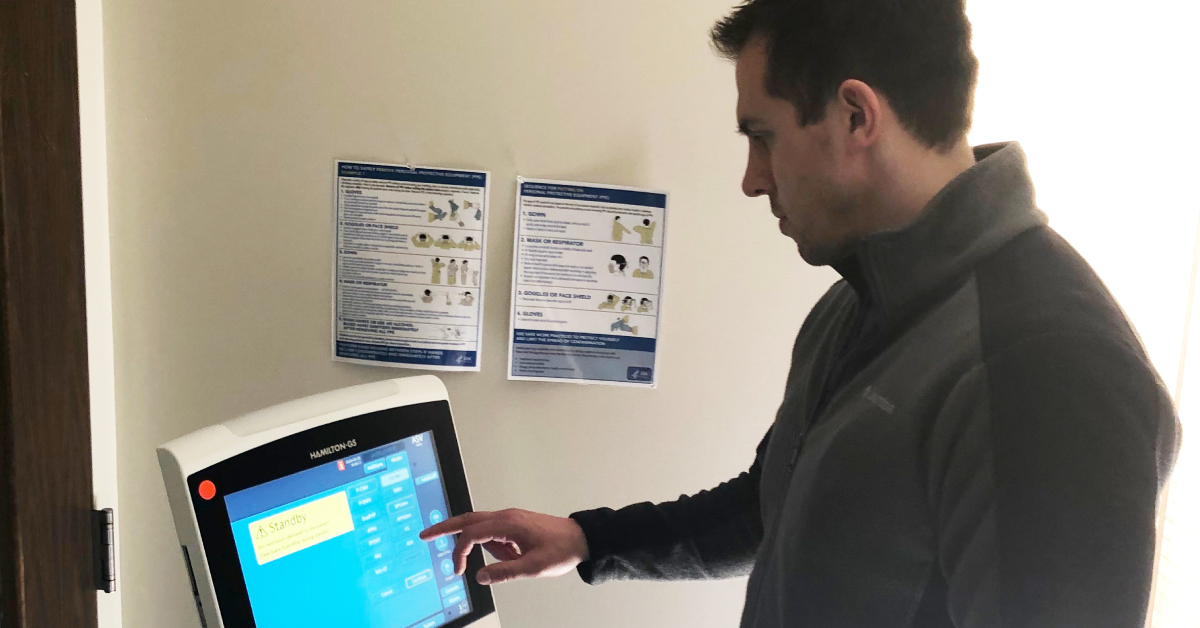Texas Tech University Health Sciences Center Teams Bring Convalescent Plasma Treatments to West Texas
 Texas Tech University Health Sciences Center (TTUHSC) medical teams from the Panhandle and South Plains recently joined a study
led by the Mayo Clinic to use convalescent plasma in severely-ill patients with coronavirus (COVID-19).
Texas Tech University Health Sciences Center (TTUHSC) medical teams from the Panhandle and South Plains recently joined a study
led by the Mayo Clinic to use convalescent plasma in severely-ill patients with coronavirus (COVID-19).
“This may be the most promising treatment we have at this time,” TTUHSC Executive Vice President and School of Medicine Dean Steven Berk, M.D, said. “This is one of the many reasons having our medical schools in Lubbock, Amarillo and the Permian Basin benefits people living in those communities. TTUHSC’s access to partnerships allows us to deliver the latest treatment options to patients in West Texas. We were able to shepherd this project into the area within 48 hours.”
Thomas Hale, Ph.D., associate dean for Research in Amarillo, and Afzal Siddiqui, Ph.D., vice president for Institutional Collaborations, quickly mobilized efforts to execute the Investigational New Drug (IND) application through the Mayo Clinic and Baylor College of Medicine. The program is a U.S. government-sponsored, FDA approved study entitled “Expanded Access to Convalescent Plasma for the Treatment of Patients with COVID-19.”
“This is a result of focused work from a team of people at TTUHSC,” Berk said. “We are also grateful to our hospital partners that provide us the facilities to make these treatments possible.”
Patients are getting this treatment at medical centers in Amarillo and Lubbock. Texas Tech Physicians (TTP) pulmonologist Victor Test, M.D., is principal investigator in Lubbock and TTP pulmonologist and critical care physician Mark Sigler, M.D., is principal investigator in Amarillo.
“During a pandemic such as this, we need to be scientific in quickly identifying potential therapies and then assessing their effectiveness,” Sigler said. “Working with the Mayo Clinic as a study site for using convalescent plasma in the management of COVID-19 was a clear opportunity to meaningfully contribute to our knowledge of how to best treat COVID-19.” After a person has recovered from COVID-19, antibodies to the virus develop.
After the plasma of such a recovered patient is collected, it is then infused into a person still fighting the infection. This offers a sick patient an opportunity to benefit from antibodies made from the donor that are specific to the new virus. The approach has been used to treat other viral infections such as Ebola and SARS.
Donating plasma is a similar experience to donating blood. Plasma is collected using a machine that separates red blood cells from the plasma in a blood donation. After plasma is collected, red blood cells are returned to the donor. Plasma is stored at a blood bank and is distributed for treatment when needed.
Recovered patients can coordinate a donation with area blood centers through their physicians, the health department or through a donor registry.
To provide convalescent plasma, donors must be eligible to donate blood and meet the criteria including:
- Prior diagnosis of COVID-19, documented by a laboratory test
- Present negative results for COVID-19, either from nasal swabs or a molecular (RNA or nucleic acid) diagnostic blood test
- Symptom-free for 14 days prior to donation
- If female, either no history of pregnancy or negative for HLA (tissue typing) antibodies
Stay up to date on the latest COVID-19 information from TTUHSC, on our coronavirus information page.
Related Stories
Celebrating Veterans: TTUHSC’s General Martin Clay’s Legacy of Service and Leadership
From his initial enlistment in the Army National Guard 36 years ago to his leadership in military and civilian health care management roles, Major General Martin Clay’s career has been shaped by adaptability, mission focus and service to others.
Texas Tech University Health Sciences Center School of Nursing Named Best Accelerated Bachelor of Science in Nursing Program in Texas
The TTUHSC School of Nursing Accelerated Bachelor of Science in Nursing (BSN) program has been ranked the No. 1 accelerated nursing program in Texas by RegisteredNursing.org.
TTUHSC Names New Regional Dean for the School of Nursing
Louise Rice, DNP, RN, has been named regional dean of the TTUHSC School of Nursing on the Amarillo campus.
Recent Stories
The John Wayne Cancer Foundation Surgical Oncology Fellowship Program at Texas Tech University Health Sciences Center Announced
TTUHSC is collaborating with the John Wayne Cancer Foundation and has established the Big Cure Endowment, which supports the university’s efforts to reduce cancer incidence and increase survivability of people in rural and underserved areas.
TTUHSC Receives $1 Million Gift from Amarillo National Bank to Expand and Enhance Pediatric Care in the Panhandle
TTUHSC School of Medicine leaders accepted a $1 million philanthropic gift from Amarillo National Bank on Tuesday (Feb. 10), marking a transformational investment in pediatric care for the Texas Panhandle.
Texas Tech University Health Sciences Center Permian Basin Announces Pediatric Residency Program Gift
TTUHSC Permian Basin, along with the Permian Strategic Partnership and the Scharbauer Foundation, Feb. 5 announced a gift that will fund a new pediatric residency.
